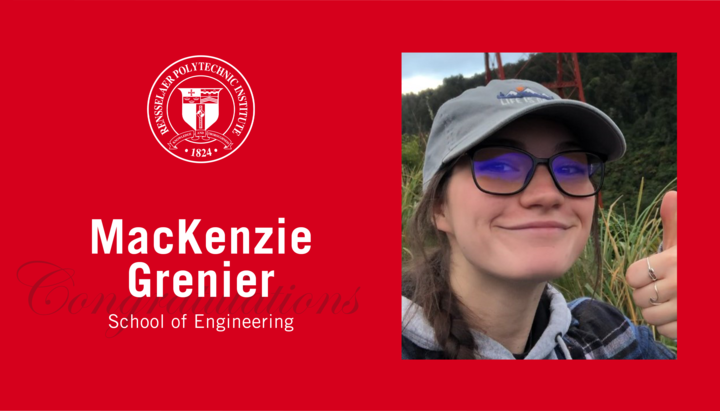For nearly as long as she can remember, MacKenzie Grenier has dreamt of exploring New Zealand — its breathtaking landscapes, its vibrant communities, its eco-minded culture. The Arch program at Rensselaer Polytechnic Institute, which requires students to seek enriching away experiences in their junior year, offered the opportunity to travel, study, and complete research abroad.
“I’ve had this fascination with New Zealand since I was younger. I just thought it was a beautiful country; it seemed incredible. They are really environmentally friendly and I care a lot about the environment,” said Grenier, who will be graduating in May with a degree in chemical engineering.
In New Zealand, Grenier spent her weeks as a research assistant with Mars Bioimaging Ltd., studying how bioimaging scans could inform potential therapies. On the weekends, she and her neighbor would take road trips to explore other parts of the country. The people she met were welcoming and supportive, giving her the confidence to travel. But about a month and a half into her visit, pandemic-forced lockdowns made it to New Zealand.
Grenier’s road-tripping plans were put on hold, but her dreams of adventure were not. On weekends — instead of traveling — Grenier spent her time planning an itinerary for the trip she’d take once it was safe to move about the country again.
“Being in quarantine, I found things to occupy myself day to day, hobbies and stuff. I started playing the ukulele. I paint a lot, so I got time to do that too when I wasn’t working,” Grenier said. “But the idea of exploring once it ended, I think, is what motivated me.”
When the virus was at bay in New Zealand and quarantine restrictions were lifted, Grenier was able to complete the travel plan she mapped out during lockdown. She took a long bus ride, a ferry trip, and rented a car, to make it to the North Island. On the island, she drove 1,400 miles in order to discover and hike various regions.
In both her travel and research experiences abroad, many of Grenier’s lasting memories center on the people she met. Working alongside one of her mentors from Mars Bioimaging, for instance, confirmed Grenier’s conviction that she wanted to continue her studies after graduation.
“Watching how passionate she was with her research and knowing how passionate I am with my interests solidified for me that I’m on the right track,” Grenier said. “Hearing about the patients they brought in for trials and how their work could change their lives confirmed for me that research and development is what I want to do. I want to be able to change someone else’s life for the better.”
Following graduation, Grenier intends to pursue her Ph.D., and she looks forward to applying what she’s learned at Rensselaer to research that can impact the world. She’s particularly interested in studying genetic diseases and finding ways to either revert or prevent them.
“My whole interest in this started because of my grandpa, who had diabetes and had to take insulin,” Grenier said. “I was like: Why do you have to keep doing that? Why can’t we just create something or put a protein in you to make it? That’s how it works in a normal person, so why can’t we do that for you?”
These are some of the transformative questions Grenier was asking throughout her undergraduate education. While her journey of discovery, at times, took her to the other side of the Pacific Ocean, it was built upon a number of strong, formative relationships she made at Rensselaer — from her women’s soccer teammates who became her first friends, to the group members she met through extracurricular organizations, to the classmates she studied alongside.
“Those are going to be the connections that I want to carry out through the rest of my life and be able to keep,” she said. “I know that those people and the impacts that they’ve had on me — either my perspectives, or my attitudes, or my ideas, that kind of thing — are definitely going to stay with me.”


